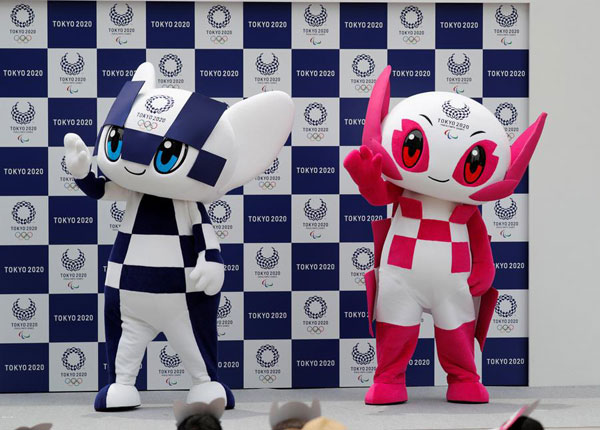东京奥运:做志愿者给学分?这还是“志愿者”吗? Half of Tokyo’s universities to use credits to “convince” students to volunteer in 2020 Olympics
中国日报网 2018-09-12 13:37

东京奥运会志愿者的招募工作已经启动,但组委会却尴尬地发现,原定的11万名志愿者很可能招不满。为了鼓励大学生加入,很多大学都推出为志愿者提供学分的激励措施。但这也引发了质疑,这还算得上是“志愿者”吗?

Tokyo 2020 Olympic Games mascot Miraitowa and Paralympic mascot Someity wave on stage during the mascots' debut in Tokyo, Japan, July 22, 2018. REUTERS/Kim Kyung-Hoon
Two years after announcing strict volunteer requirements for the Tokyo 2020 Olympics and realizing they could not get enough help for free, the Japanese ministry has instead turned to universities and their vast human resources, going so far as to altering curriculum schedules for those willing to assist.
两年前,日本对2020年东京奥运会的志愿者招募提出了严格的要求,而今却发现没有足够的志愿者应征。于是,组织方转而将目光瞄向了大学及庞大的大学生群体,甚至还为愿当志愿者的学生调整课程安排。
In the latest move to entice students to volunteer for the Olympics, a large number of universities have begun to offer academic credits as a form of remuneration. According to broadcasting corporation NHK’s survey, 49 percent of universities in Tokyo — both national and private — are now considering that option.
在吸引大学生成为奥运会志愿者的最新举措中,很多大学都开始为志愿者提供学分作为报酬。根据日本放送协会(NHK)的调查,东京有49%的大学(有国立也有私立)都正在考虑这一选择。

东京奥运会志愿者为啥这么难招?先来看看今年3月份东京奥组委公布的志愿者征集方案:
组委会表示,直接参与到奥运会的志愿者将达到8万人左右。征集方案规定志愿者至少服务10天以上,且每天工作时间不少于8小时。
组委会将为此支付保险费用,但一日三餐包括住宿交通费用均需志愿者自己承担。在上岗前,志愿者还需参加两次统一培训及说明会。除了组委会,以东京市政府的名义同样将预计招募3万志愿者,工作周期将会持续5天以上,每天5小时。
志愿者服务时间过长,不包食宿自掏腰包的政策一经发出便饱受争议。
有人吐槽说:“还敢招募8万人去受罪!”“这什么破工作简直就像奴役!”“这种强制规定,只有又有钱又闲的人才能参加!”。
学分激励政策靠谱吗?
In order to graduate, university students must achieve a set amount of credits.
为了顺利毕业,大学生都需要修满一定数额的学分。
While rewarding student volunteers with credits to advance their undergraduate programs is a nice gesture, the move also makes clear that the Olympic Committee does not want to pay for highly-skilled individuals who must speak a foreign language, work over ten full days, and sit through several training sessions. Not to mention that they must pass an interview.
学分可以让大学生本科阶段的学习继续推进。用学分奖励学生志愿者的确是个妙招,但这也清楚地表明东京奥组委并不想为那些必须说外语、至少全天工作10天、还得参加数次培训的高技能人才支付任何费用,更别提他们还得通过面试选拔了。
These people should just be properly paid.
这些工作人员应该得到合适的酬劳。
The move also raises the question of what it means to volunteer. While it’s quite obvious by now there isn’t enough people to fill the 110,000 spots required, dangling credits to push students into assisting the event is still morally ambiguous. Those who are reluctant to help might feel pressured to do so in order to score academically, which really defeats the purpose of volunteering in the first place.
此举还令人们对“志愿者”的含义提出了质疑。显而易见的是,东京奥运会需要11万名志愿者,但想加入的人数远远不够。通过学分来争取让学生参加,这种做法在道德上仍旧存疑。为了拿到学分,一些学生可能被迫去做志愿者,这首先就违背了志愿活动的初衷。

对于这个极具争议的举动,东京大学高等教育研究与发展中心的小林昌之教授说:
“Volunteering is essentially willing participation, as disaster volunteers and Olympic volunteers are inherently different. It’s unacceptable that institutions are enticing university students with promises of academic credit.”
“从本质上来说,志愿活动需要自愿参与。而救灾志愿者与奥运志愿者也有本质不同。一些机构以学分为许诺,吸引大学生做志愿者,这让人无法接受。”
As Kobayashi stated, it’s unprecedented that the Japanese ministry is doing so much to push students into volunteering for one sporting event, whereas no such effort is seen when lives are at stake during catastrophic disasters.
正如小林昌之教授所说,在日本,如此大费周章地鼓励学生成为体育比赛的志愿者,这还是头一回。即使是在民众生命受到威胁的巨大灾难中,也从未有过类似举动。
东京奥组委用学分来使学生们改变决定,日本网友们也纷纷表达了不满:
“That’s not volunteering at all.”
“这根本就算不上什么志愿活动。”
“That means no one wants to do it.”
“这意味着根本就没人愿意当志愿者。”
“I don’t understand this at all.”
“我完全不能理解。”
“So those that help out in the Paralympics get credit, but those who volunteer during disasters don’t?”
“在残奥会上帮忙的人可以拿到学分,而参加救灾的志愿者却没有?”
“This is what education in Japan is about?”
“这就是日本教育的意义所在吗?”
Offering Japanese students academic credits as a carrot on a stick seems like the wrong way to encourage volunteerism, but precious time is ticking away for the Olympic Committee. If they cannot get the required 110,000 volunteers soon, an army of emotionless androids might just work.
用学分作为激励看起来是鼓励志愿活动的一种错误方式,但对东京奥组委来说,时间也越来越紧迫。如果他们无法很快凑齐所需要的11万名志愿者,或许那些冷冰冰的机器人就要派上用场了。
来源:soranews24.com、环球网
翻译&编辑:yaning

















 英语点津微信
英语点津微信 双语小程序
双语小程序